Featuring 300 + species of birds to view right in the middle of the Central Flyway and the Prairie Potholes Region.
You've all heard of bird walks and birding trails. But this is pothole country in North Dakota, where the refuges and prairies are so expansive the birding resources call for drives rather than walks! Birding Drives Dakota has recruited top professionals to design six drives that will take you off the beaten track to the best birding in the world. Our professionals are biologists and ornithologists who have birded the back country and refuges of North Dakota all their lives. They, along with expert graphic artists, have designed full-color booklets that lay out in detail our birding trails. Our booklets contain guided maps of the birding drives that take you from the communities and back again.
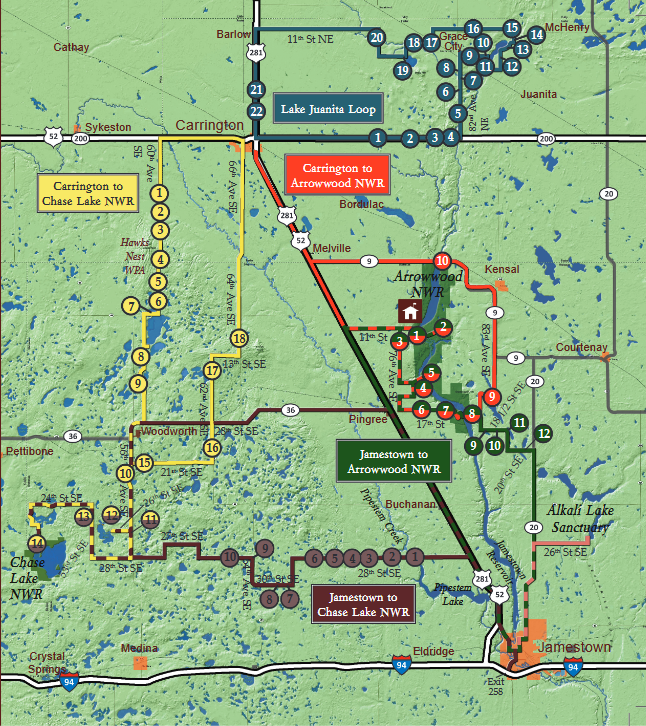
Birding Drive Map (View Brochure)
Here are some of the wonderful birds you may encounter on a birding drive.
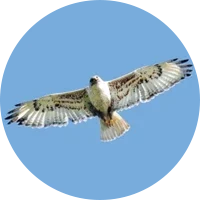
Ferruginous Hawk
Rare to uncommon, late March to October. Look for this majestic Buteo in heavily grazed native prairie with Richardson's ground squirrel colonies.
Photograph Courtesy of Rick Bohn
Sprague's Pipit
Uncommon in wet cycles, this species is much more easily heard than seen. These native prairie obligates are usually encountered skylarking high in the sky. Peak singing activity occurs in May and July. It is crucial to know the song if you intend to find the species.
Photograph Courtesy of Alex Galt
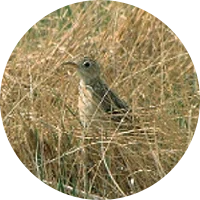
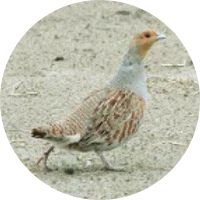
Gray Partridge
Fairly common resident. This well-established exotic is characteristic of cropped areas. The best way to search for this species is to drive gravel roads in cropland very early in the morning. Stop every half-mile to listen and scan.
Photograph Courtesy of Alex Galt
Sharp-Tailed Grouse
Fairly common resident. This popular game bird is most easily seen at various refuges where blinds are maintained at leks. Peak dancing activity is in April and May.
Photograph Courtesy of Rick Bohn
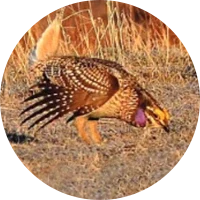
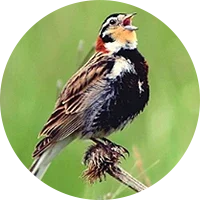
Chestnut-Collared Longspur
Common summer resident, April to late September. Prefers heavily grazed native prairie and recently burned areas. Sometimes uses cropland. Most easily found on private land. Watch for them skylarking over the prairie or sitting on fences along the roads on the Coteau.
Photograph Courtesy of Rick Bohn
Baird's Sparrow
Fairly common summer resident, May through August. Prefers lightly grazed mixed grass prairie. More common in the area in dry years. Occasionally found in hay fields and grain fields. Usually does not sit on fence wires.
Photograph Courtesy of Rick Bohn
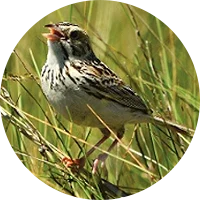
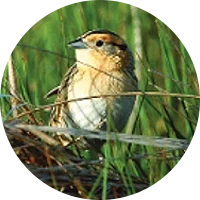
LeConte's Sparrow
Common summer resident in wet cycles, uncommon in dry cycles, May to early October. Prefers wet grassy areas, marsh edges, sedge meadows, and CRP fields. Look for this species at Arrowwood NWR in the valley along the edges of the marshes.
Photograph Courtesy of Rick Bohn
Nelson's Sharp-Tailed Sparrow
Uncommon summer resident, late May to late September. This species prefers slightly wetter habitat than LeConte’s Sparrows. Marsh edges, where there is a mix of vegetation, and fens are particularly favored. Generally does not prefer solid cattails. Often heard in the same areas as LeConte’s Sparrows, and like LeConte’s, does a lot of nocturnal singing.
Photograph Courtesy of Rick Bohn
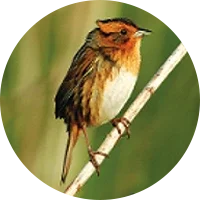
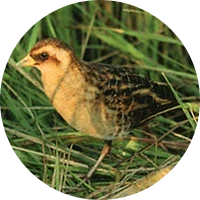
Yellow Rail
Rare to uncommon summer resident, May to September. This species is very difficult to find, and even more difficult to see. Prefers fens and boggy swales with shallow, slowly running water. Spring-fed areas are the most preferred.
Photograph Courtesy of Dave Lambeth
-
- National Wildlife Refuges
- Arrowwood National Wildlife Refuge
- Chase Lake National Wildlife Refuge
- Birding Drives Dakota Book
- Contact
- birdingdrivesinfo@gmail.com


